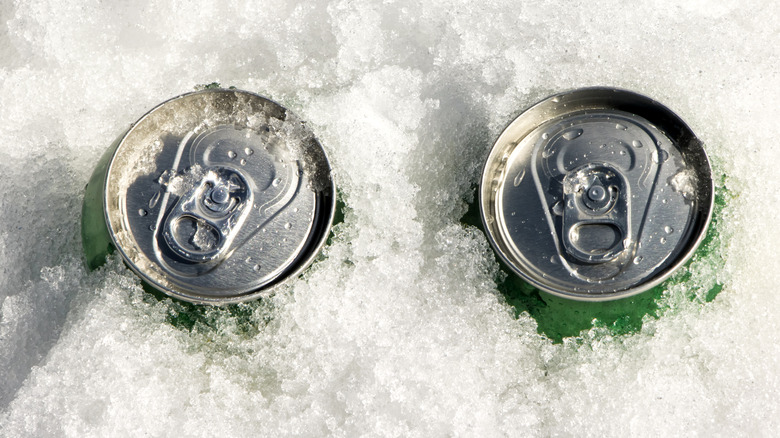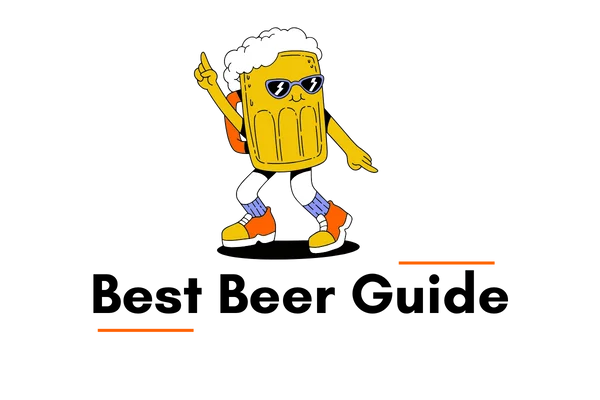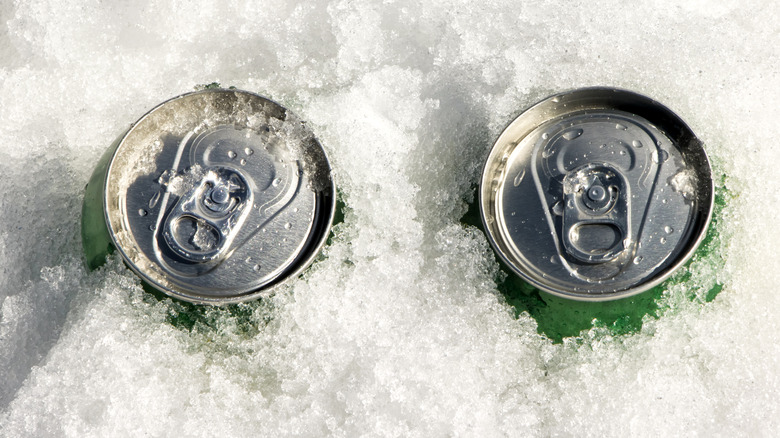Beer can go bad if it freezes, causing changes to its taste and quality. Freezing beer can have detrimental effects on its flavor and quality.
When beer freezes, the water content expands, which can damage the beer’s carbonation and cause the bottle to burst. Additionally, freezing can alter the beer’s taste, making it flat, metallic, or even sour. While it may still be safe to consume, the overall drinking experience may be compromised.
Therefore, it is best to store beer in a cool and stable environment to maintain its freshness and ensure optimal flavor.

Credit: www.thedailymeal.com
Causes Of Beer Freezing
Beer can go bad if it freezes due to temperature fluctuations. When beer freezes, it expands and can damage the beer’s flavor and texture. Storage conditions also play a crucial role in preventing beer from freezing. Storing beer in a consistent, cool environment is essential to avoid freezing and spoilage. It’s important to store beer away from extreme temperatures to maintain its quality. Additionally, storing beer upright can help prevent freezing, as it reduces the surface area exposed to temperature changes. By paying attention to temperature fluctuations and storage conditions, you can help prolong the shelf life of your beer and ensure it stays fresh for longer.
Effects Of Freezing On Beer
Freezing beer can have several consequences that affect its taste and texture.
Taste Alteration:
When beer freezes, the taste can be altered. The freezing process can cause off-flavors, resulting in a less enjoyable drinking experience. The flavors may become bland or excessively bitter, masking the original taste profile of the beer.
Texture Changes:
In addition to taste, freezing can also alter the texture of the beer. Ice crystals can form within the beer, resulting in a grainy or slushy texture. This can make the beer less pleasant to drink, affecting the overall drinking experience.
It is important to note that quality beers can often recover to a certain extent after thawing. However, repeated freezing and thawing can further degrade the taste and texture, making it advisable to avoid freezing beer whenever possible.
Identifying A Frozen Beer
Visual cues:
When you freeze a beer, there are certain visual cues that can indicate if it has been affected. The first thing to look for is the presence of ice crystals. If the beer has frozen and then thawed, you may see tiny ice crystals floating in the liquid or clinging to the bottle’s walls. These ice crystals can give a beer an uneven texture and appearance.
The presence of frozen foam or slushy beer is another indication that a beer has been frozen. When a beer freezes, the liquid expands and can cause the foam to separate from the liquid, resulting in a slushy consistency.
In addition to visual cues, it is important to consider the condition of the beer’s packaging. If the beer bottle or can is dented, bulging, or leaking, it may be an indication that it has been exposed to extreme temperatures, including freezing.
:max_bytes(150000):strip_icc()/will-liquor-freeze-760302_V3-1909ef0532f34ff0a2acee1a01b093c5.png)
Credit: www.thespruceeats.com
Does Freezing Ruin Beer?
Impact on Alcohol Content
Freezing beer can lower the alcohol content when it separates from the water and ice. This can alter the taste and quality of the beer.
Safety Concerns
When beer freezes and then thaws, it can cause the bottle or can to expand and potentially explode. This poses a safety risk and can create a mess.
Preventing Beer From Freezing
Beer can go bad if it freezes. To prevent this, store beer in a cool, dark place away from extreme temperatures. Ideal storage conditions include temperatures between 45-55°F. Quick thawing methods include placing the beer in cold water or in the refrigerator.
Always rotate your stock to ensure that beer is consumed before it can freeze. Remember to check the temperature of your storage area regularly to maintain the ideal conditions. If beer does freeze, it may lose carbonation and flavor, so try to avoid freezing it if possible.
Proper storage and handling of beer can help maintain its quality and prevent freezing. Rapid temperature changes should also be avoided to prevent beer from freezing. Remember that maintaining the right conditions is key to enjoying your beer to the fullest.

Credit: www.mcall.com
Frequently Asked Questions For Does Beer Go Bad If It Freezes
Is My Beer Ruined If It Freezes?
Freezing beer might change its taste or texture, but it doesn’t ruin it completely. Allow it to thaw slowly before drinking for the best experience.
How Do You Unfreeze Beer?
To unfreeze beer, place it in the refrigerator or under cold running water. Avoid using a microwave or hot water to prevent altering the beer’s flavor and carbonation. Allow the beer to slowly thaw for optimal taste and texture.
How Long Can Beer Stay In The Freezer?
Beer should not be left in the freezer for more than 20-30 minutes, as it can expand and possibly explode, causing a mess.
Is Alcohol Still Good If It Freezes?
Yes, alcohol is still good if it freezes. Freezing won’t spoil its quality or make it unsafe to consume. When thawed, it can be enjoyed as usual.
Conclusion
When it freezes, beer’s taste may change, affecting its quality. Avoid freezing beer for best flavor. Always check for any physical changes before consuming previously frozen beer. Proper storage can prevent beer from freezing. Understanding how freezing affects beer is crucial.
Take caution to keep your beer fresh!


1 thought on “Does Beer Go Bad If It Freezes”